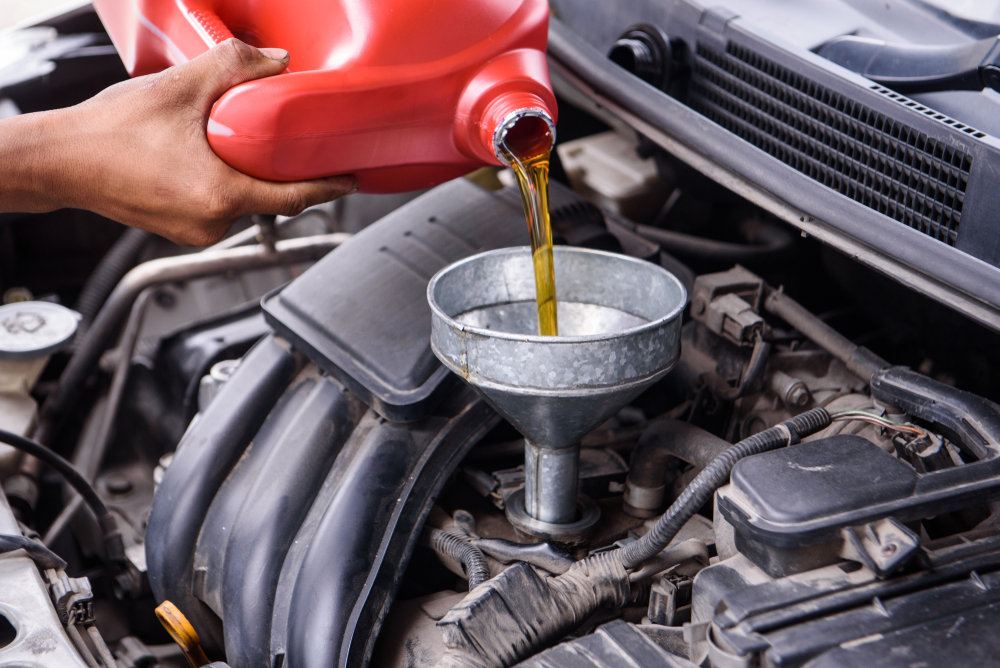7 Common Causes of Engine Sputtering
Published on
September 25, 2025
.png)
There’s nothing more frustrating than hitting the gas and hearing your motor stumble or cough. An engine that sputters is a sign that something’s not quite right under the hood. Sputtering can show up as hesitation when you accelerate, shaking at idle, or even a jerking feeling while cruising down the road.
And let’s be honest, when your car starts doing weird stuff, it’s hard not to imagine the worst. You start wondering if you’ll make it to work on time, if it’s safe to keep driving, or if a bigger repair bill is around the corner.
The thing is, sputtering can come from all kinds of places. Maybe the fuel system’s not feeding the engine right. Maybe a spark plug’s given up, or a sensor’s throwing bad info to the computer. Sometimes it’s something small, other times it’s the start of a bigger problem.
At GreatWater 360 Auto Care, we spend a lot of time sorting out problems like this. Our teammates know what signs to look for, how to test things quickly, and how to get you back on the road without the mystery and second-guessing.
Fuel System Trouble
Fuel is your engine’s lifeblood. If it’s not flowing cleanly or evenly, the engine won’t run smoothly. Dirty fuel injectors can spray unevenly, clogged filters can slow delivery, and a failing fuel pump can leave the engine starved for gas. Any of these will cause misfires and sputtering.
Picture trying to run while breathing through a straw, it’s that same kind of struggle. If your car sputters when you hit the accelerator, the fuel system is one of the first areas a mechanic will check.
If the sputtering gets worse when you step on the gas, or the car struggles to accelerate on hills, it could point to the fuel system. Sometimes you’ll also notice a whining noise from the back of the car when the fuel pump is on its way out.
Spark Plugs That Aren’t Sparking Right
Spark plugs are tiny but mighty. Their job is to ignite the air-fuel mixture in each cylinder, and if they’re worn, fouled, or cracked, the engine will stumble. One weak spark can cause a whole cylinder to misfire, which feels like sputtering or shaking.
Many drivers notice this most when starting the car in the morning or when trying to accelerate quickly. Replacing spark plugs is one of the simplest and most cost-effective repairs that can bring your engine back to life.
A rough idle, sluggish acceleration, or poor gas mileage can be signs. If you pop the hood, worn spark plugs might look blackened, oily, or corroded on the tips.
Issues With the Ignition Coil
The ignition coil is like the spark plug’s power supply. It takes low voltage from the battery and turns it into the high voltage spark plugs need. If a coil is failing, you’ll get weak or inconsistent sparks, leading to misfires and (yes, you guessed it) engine sputtering.
A bad coil can mimic spark plug problems, so it’s important to test both. Ignoring it can leave you stranded, because once a coil completely quits, the engine won’t fire at all.
A misfiring coil can cause the check engine light to flash under load. You may also notice the sputtering is worse when climbing hills or carrying extra weight. Sometimes, a mechanic can even hear a coil breaking down through a faint ticking or snapping sound.
Air Intake or Vacuum Leak
Engines are picky about air. Too much, too little, or air sneaking in through a cracked hose will throw the whole balance off. A vacuum leak often makes the engine sound rough at idle, and you may notice the sputtering calms down once you’re moving faster.
Sometimes it’s as simple as a loose hose clamp, but other times it’s a cracked intake boot or gasket. The tricky part is these leaks can be hard to spot, which is why mechanics use smoke machines to track them down.
Dirty or Failing Sensors
Modern engines rely on sensors to keep things running smoothly. The oxygen sensor, mass airflow sensor, and throttle position sensor all talk to the car’s computer to adjust fuel and spark timing.
When one of these sensors starts giving bad information, the engine responds poorly. You might feel sputtering during acceleration or see the check engine light pop on. Because the computer doesn’t know it’s getting bad data, it keeps making the wrong adjustments until the part is fixed or replaced.
A bad sensor often flips on the check engine light. You may feel hesitation when accelerating or notice the car uses more fuel than usual. If the mass airflow sensor is dirty, you might even smell a rich exhaust odor.
Exhaust System Restrictions
Your exhaust system is supposed to move gases out quickly, but if the catalytic converter is clogged or the muffler has collapsed inside, the gases back up. That pressure buildup makes it harder for the engine to “breathe,” leading to sputtering and sluggish acceleration.
One giveaway sign of a clogged exhaust is if the car feels like it’s running out of power the harder you push the gas pedal. Not only does this hurt performance, but it can also cause heat and damage in other parts of the engine.
A rotten egg smell from the exhaust can point to a bad catalytic converter. If you rev the engine and the exhaust sounds choked or weak instead of crisp, that’s another giveaway. Sometimes the underside of the converter will even glow red when it’s clogged.
Low or Unsteady Fuel Pressure
Even if your fuel system is clean, pressure matters. The pump has to push gas at the right strength, and the pressure regulator keeps it steady. If pressure is too low or keeps bouncing around, the engine won’t get what it needs.
Think of it like a shower where the water pressure keeps changing. A smooth and steady flow helps keep your engine running. That same inconsistency leaves your motor sputtering or stalling. Testing fuel pressure is something a shop can do quickly, and it often points straight to the fix.
Long crank times before the engine starts, sputtering when accelerating, or stalling under load can point to fuel pressure problems. A mechanic can confirm it quickly with a fuel pressure gauge hooked to the system.
When to Get Help
A sputtering engine isn’t something to ignore. Sometimes it’s a quick fix like spark plugs, other times it’s a bigger issue that could leave you stuck on the side of the road. If your motor feels rough, shakes at idle, or struggles to accelerate, it’s worth having a professional take a look.
At GreatWater 360 Auto Care, we’ve seen every kind of sputter there is, and our teammates have the tools and training to track down the cause. If it turns out the transmission is causing the stumble instead of the engine, we can help with that, too. Schedule an appointment online or give us a call. We’ll get your car back to running strong.


